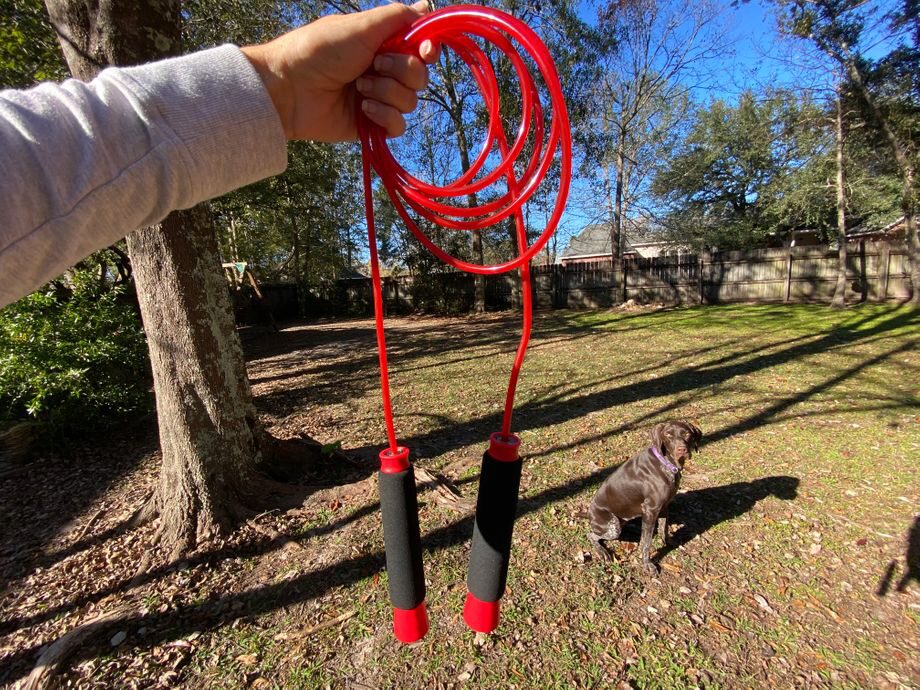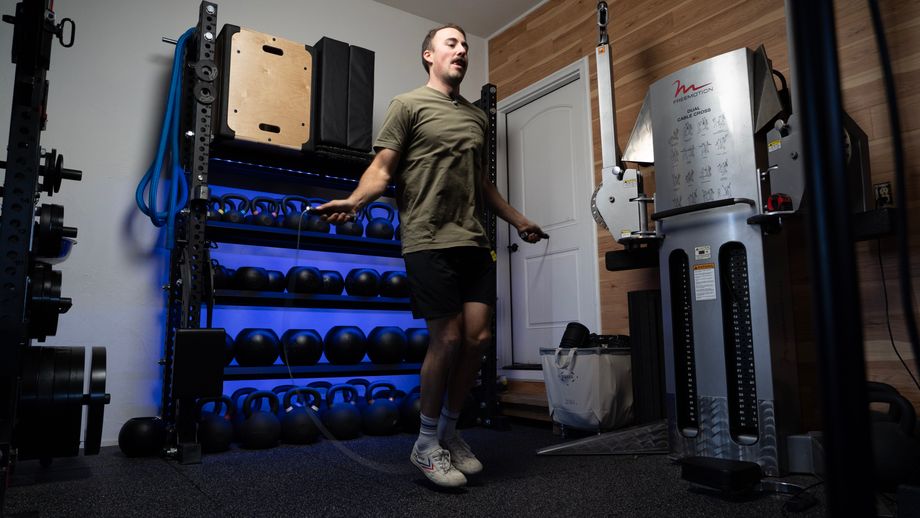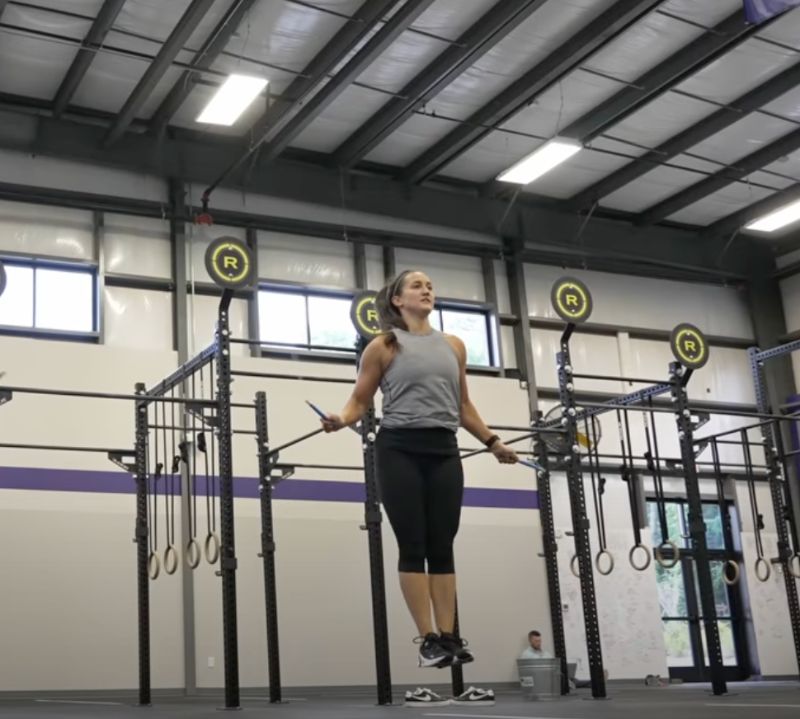We test and review fitness products based on an independent, multi-point methodology. If you use our links to purchase something, we may earn a commission. Read our disclosures.
Most of us spent time jumping rope in P.E classes or outside on the sidewalk when we were kids. But what about as adults? Studies have shown there are many health benefits of jumping rope, especially as we age.
Plus, it’s an activity the whole family can do together to stay active and have fun. Still not convinced? Check out seven of the top reasons we think you should consider picking up a jump rope in the near future.
Improves Heart Health
Any type of cardio will make your heart healthier, but jumping rope is an especially fun and quick way to do it. In a study done by the American Association for Health, Physical Education and Recreation, it was discovered that “10 minutes a day of skipping rope was as good for your heart as 30 minutes of jogging.”
People who hate running can rejoice, because you don’t have to suffer on a treadmill (if you don’t want to) in the name of health. Just pick up a jump rope, head outside, and skip for 10 minutes per day to get your heart pumping.
RELATED: Jumping Rope Vs Running
Increased Cardiovascular Endurance
According to a study done by the Research Journal of Pharmacy and Technology, skipping rope consistently can lead to a “significant improvement in VO2 max” over time.
Your VO2 max is essentially the amount of oxygen your body is able to take in and utilize during exercise. As you become more cardiovascularly fit, your VO2 max will improve, which will allow you to continue to exercise at a high intensity for longer periods of time.

Can Make You Happier
If you’ve ever watched Legally Blonde (and I mean, come on, who hasn’t?) you might remember the quote “Exercise gives you endorphins. Endorphins make you happy. Happy people just don’t kill their husbands—they just don’t.”
Ignoring the part about killing husbands, exercise does, in fact, give you endorphins, amongst a host of other feel-good things. After completing a jump-roping session, your body enjoys an “increased level of AEA, BDNF, and serotonin”. To put it plainly, these are all things that contribute to the “runner’s high” feeling, which can be achieved with any strenuous cardio workout.
Can Help with Bone Density
Doing low-impact exercises may feel better on your joints, but what about for bone density? Studies have shown that high-impact physical activity such as jumping rope can have “significant benefits” when it comes to better bone density. Putting weight on your bones by jumping can make them stronger over time.
As humans age, our bones become weaker in both composition and function, which can lead to more injuries, osteoporosis, and decreased movement. Doing frequent weight-bearing exercises (like strength training and jump roping) can help slow the weakening of bones.

Makes Coordination Better
Just like doing box jumps or catching a ball one-handed, jumping rope can improve overall coordination if done frequently. Your body learns to work together in different ways than it is used to, which can improve how well you balance and move.
With practice, you’ll be able to move with more efficiency and ease, which will not only benefit you when you’re jumping rope, but also in everyday life. This is even truer of people who play sports (cough cough, soccer) because you’ll be improving your footwork even when you’re not touching a ball, since you’ll be practicing staying on your toes.
Burns Calories
Jumping rope expends a lot of energy––your muscles are hard at work and you’re likely huffing and puffing because it is, well, cardio. Since calories are units of energy, you are consequently burning them as you jump rope.
Your body burns calories throughout the day––whether you’re walking up stairs at work, or putting the kids to bed, you’re burning calories. However, intentional exercise (like jumping rope) burns far more calories in a short amount of time versus a typical NEAT (non-exercise activity thermogenesis) activity. NEAT is still super important though, so don’t forget to move throughout the day.

Fitness Routine Diversification
If you’re getting tired of hopping on the treadmill or your bike for the millionth time to get your cardio in, it might be time to switch up your exercise routine. Jumping rope is a fun way to workout almost anywhere you go, since jump ropes are portable and can be taken on-the-go.
Plus, if you’re actually enjoying the form of exercise you’re doing, you’ll likely stick with it for longer. No one wants to drag themselves to do the same workout that they hate again and again. If we view fitness as something we’re in for the long-haul versus a temporary fix for weight loss (or something similar), we learn to diversify the types of activities we do for a workout to prevent burnout.
How to Jump Rope

It is important to choose the right jump rope for your height and goals prior to getting started. Plenty of the best jump ropes will be adjustable, but take a look at the item’s product page to see the range of heights the rope suits. To check if a jump rope is the correct length for you, simply stand on the middle of the rope and hold the handles up towards your armpits. The handles should reach just past your pits near your shoulders.
While there are tons of different kinds of jump ropes suited for technology gurus, CrossFit enthusiasts, and more, picking a simple, inexpensive rope, like the XYLSports Jump Rope, is the way to go for beginners.
Once you’ve established the correct jump rope length (and hit a quick warm-up), it’s time to get jumping. Start with the rope behind your body and hop over the rope as it comes around to your front. Instead of moving your entire arms in circles to power the rope’s arc, try to just turn your wrists in tandem with each other. Staying on the balls of your feet is key to not getting the rope caught under you as you jump.
Lastly, be patient with yourself. You’re not going to master a double-under or 500 continuous jumps in your first go and you shouldn’t expect to. Like with everything else in life, practicing (and time) will make you better.
Final Verdict
Jumping rope is an excellent form of cardiovascular training that can be taken on-the-go. Plus, who said it couldn’t be fun to master? Let’s get jumping!
Benefits of Jumping Rope FAQs
What happens if you jump rope everyday?
If you jump rope a few times per week, you will likely improve your heart health and increase your cardiovascular endurance. Plus, you’ll be able to get a full-body workout in a short period of time. It isn’t recommended that you do any high-impact exercise daily because your body needs time to recover.
Can skipping rope reduce belly fat?
Any type of exercise has the potential to reduce fat all over, but you cannot spot reduce belly fat specifically. In conjunction with a nutritious diet, jumping rope can help you lose weight, and therefore, reduce belly fat. However, please consult with a medical professional before starting a weight loss plan.
Is 10 minutes of jump rope enough?
Yes! Any amount of time you can move your body is a win. Sure, it would be ideal if you could jump rope for 30 full minutes, but that isn’t always feasible for people. A quick jump rope session can improve your cardiovascular health, bone mineral density, motor coordination, and your mental health. Now that’s a form of cardio I actually want to do!
What is the best weighted jump rope and should I purchase one?
Our favorite weighted jump rope is the Rogue Fitness PRO Jump Rope. Weighted jump ropes are not for the faint of heart––GGR writer and editor Amanda Capritto is an experienced athlete, and maxed out at seven double-unders with this rope.
A weighted jump rope workout will definitely increase your heart rate and allow both your upper body and lower body to get in on the burn with this higher intensity workout.
Further reading

Our Titan Fitness Functional Trainer review takes an in-depth look at this machine, and whether it’s a good fit for your home gym. Read more

Find out if No Cow bars live up to their reputation as the best vegan protein bar in our No Cow protein bar review. Read more

In this Ergatta Rower review, take a look at why I think this might be the nicest looking cardio machine I’ve ever seen. But does it stack up to the competition rowing wise? Read more

If you’re here to get your recovery in natural scenery, you’re in luck; here are our expert-tested selections for the best outdoor saunas. Read more

